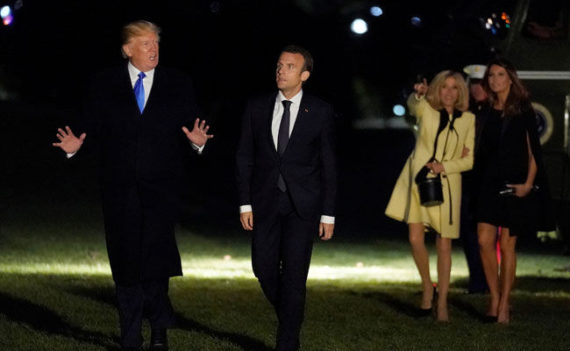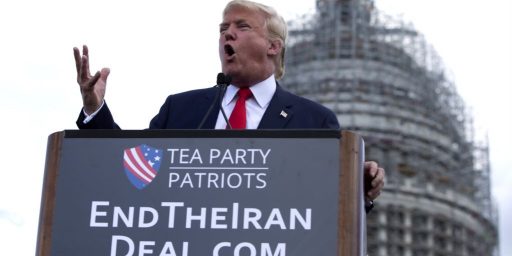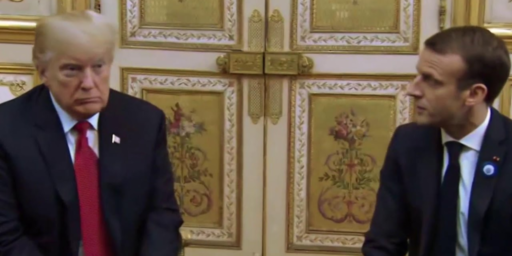Macron To Lobby Trump On Iran Nuclear Deal
French President Emmanuel Macron is in the U.S. hoping to lobby President Trump to keep the United States in the nuclear deal with Iran. He's got his work cut out for him.

French President Emmanuel Macron is in Washington on an Official State Visit, but his real mission is what is essentially a last-minute effort to convince President Trump to not withdraw the United States from the Joint Comprehensive Plan Of Action (JCPOA), the deal that the United States and five other nations reached with Iran regarding that nation’s nuclear program. Macron’s visit will be almost immediately be followed by a visit from a lower-key visit by German Chancellor Angela Merkel aimed at the same purpose:
WASHINGTON — President Trump will come under increasing pressure from visiting French and German leaders this week not to scrap the three-year-old nuclear agreement with Iran next month as American and European negotiators make tentative progress toward a new deal to toughen the limits on Tehran.
President Emmanuel Macron of France arrived Monday at the White House for the first state visit of Mr. Trump’s presidency, intent on using his unusual bond with the American president to try to persuade him to preserve the Iran deal, at least for now. While not as close personally to Mr. Trump, Chancellor Angela Merkel of Germany will follow on Friday to reinforce the message.
The back-to-back visits come weeks before a May 12 deadline set by Mr. Trump to “fix” the Iran agreement or walk away from it. Under the agreement, sealed in 2015 by President Barack Obama, Iran has curbed its nuclear program in exchange for relief from crippling international sanctions. But Mr. Trump and other critics have assailed it because it begins to expire after a decade and does not block Iran’s missile development or try to stop it from destabilizing the region.
In recent weeks, American and European negotiators have made progress toward side agreements that would lay out new standards for Iran to meet or risk the reimposition of sanctions by the West. Negotiators have generally reached a consensus on measures to constrain Iran’s ballistic missile program, according to people briefed on the talks, but remain divided over how to extend the restrictions of the original agreement due to lapse starting in 2025.
Most importantly, the Europeans want assurances that if side agreements are reached, the United States will stay in the deal, a hard commitment for American officials to make given Mr. Trump’s mercurial nature. But European leaders hope they can persuade him to hold off by showing enough progress in negotiations that he can claim he is making the deal better.
“I suspect that this will be a very difficult conversation,” said Wendy R. Sherman, the former top State Department official who negotiated the Iran deal for Mr. Obama. “I’m sure that Macron will say how important staying in the deal is to a strong trans-Atlantic relationship in all things, particularly security. I think Merkel will deliver the same message on Friday.”
Even so, the White House signaled Monday that Mr. Trump enters the talks with one set impression. “He thinks it’s a bad deal — that certainly has not changed,” said Sarah Huckabee Sanders, the White House press secretary.
The fate of the Iran agreement could influence the president’s forthcoming meeting with Kim Jong-un, the North Korean leader who already has a small nuclear arsenal. Whatever its flaws, American officials understand that canceling the Iran deal days or weeks before that meeting might complicate Mr. Trump’s chances of making an agreement with Mr. Kim.
Mohammad Javad Zarif, Iran’s foreign minister, implicitly made that point Monday by noting that the negotiations that led to the nuclear agreement between his country and six world powers involved give and take by all sides.
“And now the United States is saying, ‘What’s mine is mine and what’s yours is negotiable. But whatever I gave you, now I want it back,'” Mr. Zarif said in an interview with The National Interest, a Washington policy magazine. “Who would, in their right mind, deal with the U.S. anymore?”
Mr. Trump faces conflicting positions among his own advisers as he reconstitutes his national security team. John R. Bolton, his new national security adviser, has long advocated simply ending the Iran deal, while Mike Pompeo, set to become secretary of state, is open to keeping it if strong new provisions can be negotiated.
(…)
Mr. Macron telegraphed his message on Iran by appearing on the president’s favorite network, Fox News, over the weekend.
Is the pact “a perfect thing for our relationship with Iran? No,” he said on “Fox News Sunday.” “But for nuclear, what do you have as a better option? I don’t see it. What is the what-if scenario or your Plan B? I don’t have any Plan B for nuclear against Iran.”
Mr. Macron added that he supported modifications to the deal, known as the Joint Comprehensive Plan of Action, or J.C.P.O.A. “My point is to say, don’t leave now to J.C.P.O.A. as long as you don’t have a better option for nuclear, and let’s complete it with ballistic missile and a regional containment,” Mr. Macron said.
Mr. Zarif picked up on that on Monday. “President Macron is correct in saying there’s no ‘Plan B’ on JCPOA,” Mr. Zarif wrote on Twitter. “It’s either all or nothing. European leaders should encourage President Trump not just to stay in the nuclear deal, but more importantly to begin implementing his part of the bargain in good faith.”
The negotiations with European officials, led by Brian Hook, the State Department’s director of policy planning, have found some common ground, according to people briefed on the talks. Negotiators are developing two annexes, or side agreements, to the original deal, one intended to constrain Iran’s missile program and the other to confront its aggressions in the Middle East.
Negotiators have agreed on strong measures to impose sanctions on Iran if it tests long-range missiles and are debating a framework document to respond to testing of short- and medium-range missiles. They have agreed that Iran would be sanctioned if it blocks international nuclear inspectors from any site, including military sites. And they have made progress in defining a trigger for reimposing sanctions lifted as part of the 2015 deal — if Iran were found to have expanded its nuclear program enough to allow it to develop a weapon in less than a year.
But negotiators are divided over what would happen then. The Trump administration insists that sanctions be reimposed automatically if Iran trips that one-year wire, while the Europeans want the trigger to be a determination that Iran’s expansion is inconsistent with its civilian nuclear program. If the Americans and Europeans ultimately agree, that would effectively end the expiration provisions known as “sunsets” by making the one-year limit permanent.
“The Europeans have moved very far in a few months, and I think this should be bridgeable, but of course it really depends on Macron and Trump,” said Mark Dubowitz, chief executive of the Foundation for Defense of Democracies. “It sounds narrow, but it’s actually pretty fundamental. It’s entirely possible that the thing breaks down on that basis.”
The Germans are the most resistant among the Europeans, arguing that renegotiating without Iran or the other parties to the deal, Russia and China, amounts to bad faith and ultimately will cause the original agreement to collapse. If no side agreements are reached, the Trump administration is also preparing contingency plans for Mr. Trump to withdraw from the Iran deal altogether and what the United States would then do to counter Iran.
Leaving aside the issue of how exactly negotiating side agreements to the JCPOA without including either Iran or the other to major powers that were involved in the negotiations, Russia and China, is going to work out, it seems fairly clear that Macron is going to have his work cut out for him over the next two days, as does Chancellor Merkel when she visits later this week. President Trump’s disdain for the nuclear deal has been well known for the better part of three years now, and since becoming President he’s been on a path that seems to lead to only one outcome, withdrawing the United States from an agreement that, while imperfect, is working as it was intended to work on the eve of what is supposed to be one of the most important summit meetings any American President has had in the past quarter-century.
Virtually from the moment that he became a candidate, which happened to occur just as the final touches were being put on the agreement and it was heading to Congress, Trump repeatedly attacked that agreement. Typically, he did so using false and misleading information that circulated in conservative media and punditry circles to do so and claimed repeatedly that he could have negotiated a better deal. In September 2015, while Congress was considering the agreement, Trump was the co-host of a rally in Washington with fellow Republican candidate for President Ted Cruz that sought to rally support against the agreement. Ultimately that effort failed and the deal went into effect but that didn’t stop Trump from continuing to criticize the agreement throughout the primary and General Election campaigns and to continue to spread baseless claims about the agreement that had become popular in conservative media.
Upon becoming President, Trump’s disdain for the agreement and his eagerness to go forward with his campaign promise to either renegotiate the JCPOA to somehow make it “better,” or to pull out of the agreement completely was rather obvious. Notwithstanding that rhetoric, the President passed on his first opportunity to get out from under the deal roughly a year ago when the Administration ended up lifting another set of sanctions as called for under the agreement. It was obvious at the time, though, that Trump was led to do this reluctantly and that the deal was in serious danger of falling apart or at least becoming far less effective. Trump’s next opportunity to attack the deal came in October, and at that point, he showed none of the reluctance we had seen in May. It was at that point that the President declined to certify to Congress that Iran was complying with the agreement. This action was taken notwithstanding the fact that both Secretary of Defense James Mattis and Secretary of State Rex Tillerson had stated on the record that Iran was complying with its obligations under the agreement and that staying in the JCPOA was in the national interests of the United States. It also occurred notwithstanding the fact that the International Atomic Energy Agency (IAEA), which is charged with monitoring Iran’s compliance with the agreement, has said each time it has been required to report on the status of the agreement that Iran is living up to its obligations under the agreement. Notwithstanding this, Trump asserted without any real evidence that Iran was violating the “spirit” of the agreement without specifying how that was the case. In support of his claim, Trump cited matters that were not covered by the terms of the JCPOA such as Iran’s missile program, the foreign policy positions it has taken that are often adverse to those of the United States, and actions that took place in the past such as terrorist attacks that took place as long as twenty years or more in the past. While this action, or rather failure to act, didn’t formally take the United States out of the JCPOA or result in the reimposition of sanctions that had been lifted pursuant to the agreement, many outside observers assumed that it was just the first step in a process that would lead to that final decision at some point in the future.
For the most part, the President’s position on the agreement has not been supported by our European allies, or by the other powers involved in the agreement. Earlier this year, the leaders of the U.K., France, and Germany took the time to issue a statement of support for the JCPOA and made clear that they did not support the position taken by the Trump Administration and continued to rebuff American efforts to renegotiate the deal even while attempting to negotiate some sort of side agreement that would placate the United States while keeping the core of the JCPOA intact. More importantly, both Russia and China have made it clear that they don’t support this unilateral action on the part of the United States and Iran has made clear that American withdrawal from the agreement.
It’s with this history that Macron shows up at the White House today to try to convince Trump to deviate from what seems like a set course of action. Whether he succeeds or not could have serious implications on two fronts. The first, of course, is in the Middle East itself, which is already on hair triggers thanks to the situation in Syria and the ongoing and increasingly tragic Saudi-Iranian proxy war in Yemen in which Saudi armed forces, most recently, unleashed an attack that ended up killing nearly two dozen civilians taking part in a wedding. The second front lies thousands of miles away on the Korean Peninsula. As we sit here today we are on the verge of a potential summit meeting between President Trump and Kim Jong Un. While that meeting is filled with dangers all its own. Withdrawing from the JCPOA on the eve of that agreement arguably sends the signal that the United States in general and this Administration particularly cannot be trusted to live up to international agreements, thus undermining the potential of any significant agreement with the DPRK. So I suppose we should hope that President Macron and Chancellor Merkel are successful in their efforts. Given the fact that Trump is now being advised by men such as Mike Pompeo and John Bolton, both of whom have been harsh critics of the JCPOA, I’m not optimistic.




No matter what Macron and Merkel say or do, no matter how oleaginously they flatter Trump (because they’ve long since known that this is the quickest and easiest way to get him to comply), when they go home, Bolton and Pompeo will still be there, pushing Trump to do what they want.
Trump would negotiate a deal that gives nukes to Iran as well as massive aid. but that’s ok, because the nukes mean high-paying jobs, and Mexico will pay for the aid; besides the Iranians want the money to build a wall to keep Mexicans out.
The only way Macron can get Dennison to change his mind is to convince him that Obama had nothing to do with it…because it’s not about the deal…it’s about Obama making a fool of Dennison at the WH Correspondents Dinner several years ago. Iran having nukes means nothing to Dennison. It’s not about policy. It’s not about ideology. It’s all about Dennison’s precious snowflake-thin orange-colored skin.
So now Trump is apparently threatening Iran with nasty consequences if they restart their nuclear program. Isn’t that basically an admission that it’s currently stopped and the Iran deal is…working? Not that his sycophants will get that or acknowledge it (nor will Trump). God that man is incredibly stupid-no wonder Scott Adams likes him. Never has the Dilbert principle of failing upward been more spectacularly proved.
Why would Macron do this? I believe that it is in the interests of the US to be friendly rather than hostile to Tehran, but Macron is not obligated to act in America’s behalf. France has historical ties to Lebanon, Syria, and Iran. I believe that there are many francophones in Iran. Hostility between the US and Iran gives France a chance to create ties to a major petroleum producer. “You can’t deal with the US, and remember the nice exile we provided for Ayatollah Khomeini.” Such a move would also allow Macron to position himself as a bigger player on the world stage than Angela Merkel. Letting the US bollix up the JCPOA gives Macron a chance to put one over on the US and the Germans; no French guy can resist such an opportunity.
@Daryl’s other brother Darryl:
I think this is part of the truth. Trump hates the deal because Obama made it. But there’s something else.
If you look at Trump’s business history, you realize that what he means by “a deal” is different from what most people mean. To most people, a deal is mutually beneficial. To Trump, it’s where everyone else gets hosed and he gets rich. Deals, to him, are not about cooperation but about dominance. So he sees that we made a deal with Iran and Iran isn’t getting hosed … therefore we must be. Therefore it’s a bad deal.
This is also his view of NAFTA, TPP, Paris, etc. Any deal where the other side isn’t getting hosed is a bad one in his worldview.
@Hal_10000:
This also seems to be the view of a not-insignificant portion of his base, who have been convinced, via right wing media, that this is also the meaning of “deal” and that their side has always been the victim in such deals.